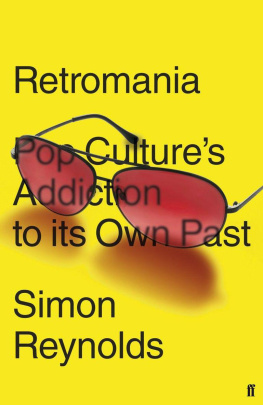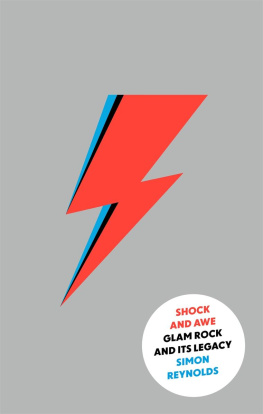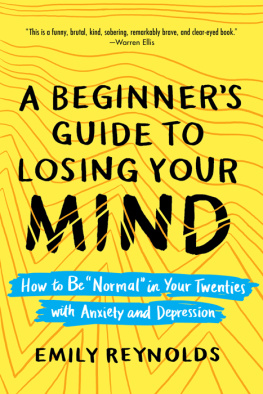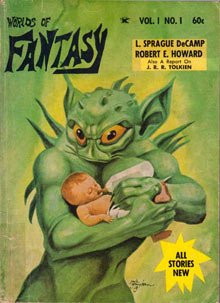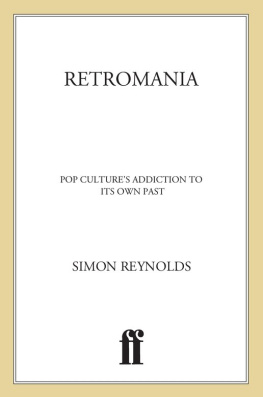Reynolds - Retromania
Here you can read online Reynolds - Retromania full text of the book (entire story) in english for free. Download pdf and epub, get meaning, cover and reviews about this ebook. year: 2011, publisher: Faber and Faber Ltd, genre: Home and family. Description of the work, (preface) as well as reviews are available. Best literature library LitArk.com created for fans of good reading and offers a wide selection of genres:
Romance novel
Science fiction
Adventure
Detective
Science
History
Home and family
Prose
Art
Politics
Computer
Non-fiction
Religion
Business
Children
Humor
Choose a favorite category and find really read worthwhile books. Enjoy immersion in the world of imagination, feel the emotions of the characters or learn something new for yourself, make an fascinating discovery.
- Book:Retromania
- Author:
- Publisher:Faber and Faber Ltd
- Genre:
- Year:2011
- Rating:5 / 5
- Favourites:Add to favourites
- Your mark:
- 100
- 1
- 2
- 3
- 4
- 5
Retromania: summary, description and annotation
We offer to read an annotation, description, summary or preface (depends on what the author of the book "Retromania" wrote himself). If you haven't found the necessary information about the book — write in the comments, we will try to find it.
Retromania — read online for free the complete book (whole text) full work
Below is the text of the book, divided by pages. System saving the place of the last page read, allows you to conveniently read the book "Retromania" online for free, without having to search again every time where you left off. Put a bookmark, and you can go to the page where you finished reading at any time.
Font size:
Interval:
Bookmark:
SIMON REYNOLDS

Pop Cultures Addiction to
Its Own Past

In memory of my brother Tim.
And with love to my surviving brothers Jez and Hugo.

For footnotes and additional material related to the book, go to the blog Retromania The Footnotes at http:// retromaniafootnotes .blogspot.com/

The Re Decade
We live in a pop age gone loco for retro and crazy for commemoration. Band reformations and reunion tours, tribute albums and box sets, anniversary festivals and live performances of classic albums: each new year is better than the last one for music from yesteryear.
Could it be that the greatest danger to the future of our music culture is its past ?
Maybe that sounds unnecessarily apocalyptic. But the scenario Im imagining isnt a cataclysm so much as a gradual wind-down. This is the way that pop ends, not with a BANG but with a box set whose fourth disc you never get around to playing and an overpriced ticket to the track-by-track restaging of the Pixies or Pavement album you played to death in your first year at university.
Once upon a time, pops metabolism buzzed with dynamic energy, creating the surging-into-the-future feel of periods like the psychedelic sixties, the post-punk seventies, the hip-hop eighties and the rave nineties. The 2000s felt different. Pitchfork critic Tim Finney noted the curious slowness with which this decade marches forward. He was specifically monitoring electronic dance music, which all through the nineties had been pop cultures vanguard, hurling forth a new Next Big Thing every season. But Finneys observation can be applied not just to dance music but to popular music in its entirety. The sensation of moving forward grew fainter as the decade unfurled. Time itself seemed to become sluggish, like a river that starts to meander and form oxbow lakes.
If the pulse of NOW felt weaker with each passing year, thats because in the 2000s the pop present became ever more crowded out by the past, whether in the form of archived memories of yesteryear or retro-rock leeching off ancient styles. Instead of being about itself, the 2000s has been about every other previous decade happening again all at once: a simultaneity of pop time that abolishes history while nibbling away at the presents own sense of itself as an era with a distinct identity and feel.
Instead of being the threshold to the future, the first ten years of the twenty-first century turned out to be the Re Decade. The 2000s were dominated by the re- prefix: re vivals, re issues, re makes, re -enactments. Endless re trospection: every year brought a fresh spate of anniversaries, with their attendant glut of biographies, memoirs, rockumentaries, biopics and commemorative issues of magazines. Then there were the band re formations , whether it was groups re uniting for nostalgia tours in order to re plenish (or to bloat still further) the members bank balances (Police, Led Zeppelin, Pixies the list is endless) or as a prequel to re turning to the studio to re launch their careers as recording artists (Stooges, Throbbing Gristle, Devo, Fleetwood Mac, My Bloody Valentine et al.).
If only it was just the old music and old musicians coming back, in archived form or as reanimated performers. But the 2000s was also the decade of rampant re cycling: bygone genres re vived and re novated, vintage sonic material re processed and re combined. Too often with new young bands, beneath their taut skin and rosy cheeks you could detect the sagging grey flesh of old ideas.
As the 2000s proceeded, the interval between something happening and its being re visited seemed to shrink insidiously. The I Love the [Decade] TV series created by the BBC and adapted by VH1 for America hurtled through the seventies, eighties and nineties, and then with I Love the New Millennium , which aired in the summer of 2008 wrapped up the 2000s before the decade was even over. Meanwhile, the re issue industrys tentacles have already reached the late nineties, with box sets and remastered/expanded versions of German minimal techno, Britpop and even Morrisseys lamest run of solo albums. The rising tide of the historical past is lapping at our ankles. As for re vivals, the music scene mostly abided by the Twenty-Year Rule of Revivalism: the eighties were in for much of the 2000s, in the form of the post-punk , electropop and most recently Goth resurgences. But you also had precocious glimpses of nineties revivalism, with the nurave fad and the rise of shoegaze, grunge and Britpop as reference points for new indie bands.
The word retro has a quite specific meaning: it refers to a self-conscious fetish for period stylisation (in music, clothes, design) expressed creatively through pastiche and citation. Retro in its strict sense tends to be the preserve of aesthetes, connoisseurs and collectors, people who possess a near-scholarly depth of knowledge combined with a sharp sense of irony. But the word has come to be used in a much more vague way to describe pretty much anything that relates to the relatively recent past of popular culture. Following this looser common usage of the word, Retromania investigates the entire range of contemporary uses and abuses of the pop past. This includes phenomena such as the vastly increased presence in our lives of old pop culture: from the availability of back-catalogue records to YouTubes gigantic collective archive and the massive changes in music consumption engendered by playback devices like the iPod (which often functions as a personal oldies radio station). Another major area is the natural greying of rock music some fifty years into its existence : performers from the past who stick around, continuing to tour and record, as well as artists who mount comebacks after a long period of retirement. Finally, theres new old music made by young musicians who draw heavily on the past, often in a clearly signposted and arty way.
Earlier eras had their own obsessions with antiquity, of course, from the Renaissances veneration of Roman and Greek classicism to the Gothic movements invocations of the medieval. But there has never been a society in human history so obsessed with the cultural artifacts of its own immediate past . That is what distinguishes retro from antiquarianism or history: the fascination for fashions, fads, sounds and stars that occurred within living memory. Increasingly, that means pop culture that you already experienced the first time around (as a conscious , popaware person, as opposed to stuff that you lived through unaware as a small child).
This kind of retromania has become a dominant force in our culture, to the point where it feels like weve reached some kind of tipping point. Is nostalgia stopping our cultures ability to surge forward, or are we nostalgic precisely because our culture has stopped moving forward and so we inevitably look back to more momentous and dynamic times? But what happens when we run out of past? Are we heading towards a sort of culturalecological catastrophe, when the seam of pop history is exhausted? And out of all the things that happened this past decade, what could possibly fuel tomorrows nostalgia crazes and retro fads?
Im not alone in feeling perplexed by these prospects. Ive lost count of the number of hand-wringing newspaper columns and blog posts that worry about what happened to innovation and upheaval in music. Where are the major new genres and subcultures of the twenty-first century? Sometimes its the musicians themselves who sound a note of weary dj vu. In a 2007 interview, Sufjan Stevens declared: Rock and roll is a museum piece. There are great rock bands today I love the White Stripes, I love the Raconteurs. But its a museum piece. Youre watching the History Channel when you go to these clubs. Theyre just reenacting an old sentiment. Theyre channeling the ghosts of that era the Who, punk rock, the Sex Pistols, whatever. Its been done. The rebellions over.
Font size:
Interval:
Bookmark:
Similar books «Retromania»
Look at similar books to Retromania. We have selected literature similar in name and meaning in the hope of providing readers with more options to find new, interesting, not yet read works.
Discussion, reviews of the book Retromania and just readers' own opinions. Leave your comments, write what you think about the work, its meaning or the main characters. Specify what exactly you liked and what you didn't like, and why you think so.

